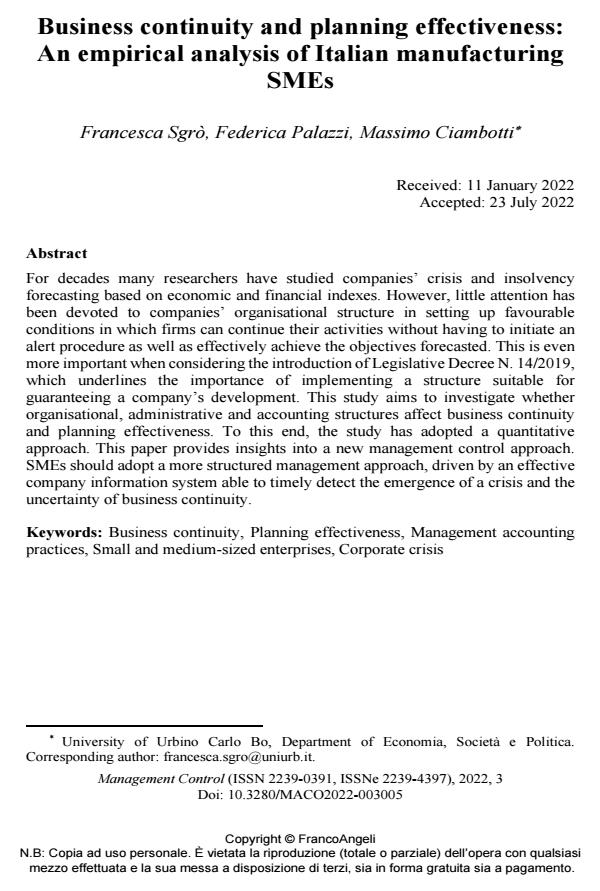Business continuity and planning effectiveness: An empirical analysis of Italian manufacturing SMEs
Journal title MANAGEMENT CONTROL
Author/s Francesca Sgrò, Federica Palazzi, Massimo Ciambotti
Publishing Year 2022 Issue 2022/3
Language English Pages 20 P. 89-108 File size 336 KB
DOI 10.3280/MACO2022-003005
DOI is like a bar code for intellectual property: to have more infomation
click here
Below, you can see the article first page
If you want to buy this article in PDF format, you can do it, following the instructions to buy download credits

FrancoAngeli is member of Publishers International Linking Association, Inc (PILA), a not-for-profit association which run the CrossRef service enabling links to and from online scholarly content.
For decades many researchers have studied companies’ crisis and insolvency forecasting based on economic and financial indexes. However, little attention has been devoted to companies’ organisational structure in setting up favourable conditions in which firms can continue their activities without having to initiate an alert procedure as well as effectively achieve the objectives forecasted. This is even more important when considering the introduction of Legislative Decree N. 14/2019, which underlines the importance of implementing a structure suitable for guaranteeing a company’s development. This study aims to investigate whether organisational, administrative and accounting structures affect business continuity and planning effectiveness. To this end, the study has adopted a quantitative approach. This paper provides insights into a new management control approach. SMEs should adopt a more structured management approach, driven by an effective company information system able to timely detect the emergence of a crisis and the uncertainty of business continuity.
Keywords: Business continuity, Planning effectiveness, Management accounting practices, Small and medium-sized enterprises, Corporate crisis
- Sustainable Governance Andrea Cardoni, Evgeniia Kiseleva, pp.145 (ISBN:978-3-031-37491-3)
- Sustainable Governance Andrea Cardoni, Evgeniia Kiseleva, pp.67 (ISBN:978-3-031-37491-3)
Francesca Sgrò, Federica Palazzi, Massimo Ciambotti, Business continuity and planning effectiveness: An empirical analysis of Italian manufacturing SMEs in "MANAGEMENT CONTROL" 3/2022, pp 89-108, DOI: 10.3280/MACO2022-003005